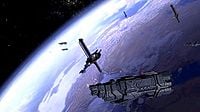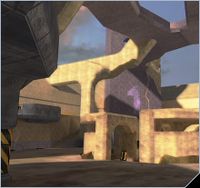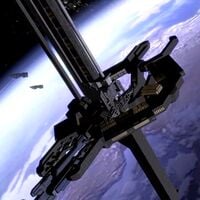Earth: Difference between revisions
From Halopedia, the Halo wiki
| Line 62: | Line 62: | ||
[[The Covenant]] returned in force and in mass following the [[Prophet of Regret]]'s abortive attack and Covenant assault forces succeeded in penetrating the orbital defenses. At [[Mount Erebus]], the sea floor off of the the [[Yucatan Peninsula]], and the [[Centennial Orbital Elevator]] the Covenant were stymied by three [[SPARTAN-II]]'s. However UNSC forces were unable to repulse and route Covenant landings in [[Kenya]]. | [[The Covenant]] returned in force and in mass following the [[Prophet of Regret]]'s abortive attack and Covenant assault forces succeeded in penetrating the orbital defenses. At [[Mount Erebus]], the sea floor off of the the [[Yucatan Peninsula]], and the [[Centennial Orbital Elevator]] the Covenant were stymied by three [[SPARTAN-II]]'s. However UNSC forces were unable to repulse and route Covenant landings in [[Kenya]]. | ||
The arrival in-system of [[SPARTAN-117]] in a Covenant-controlled [[Forerunner Dreadnought]], freshly escaped from the [[Battle of Installation 05]], was unexpected. SPARTAN-117 disembarked from the dreadnought at [[Io Station]] before returning to Earth<ref name="Halo_Uprising">''[[Halo: Uprising]]''</ref> where he rendezvoused with UNSC forces at [[Crow's Nest (Base)|Crow's Nest]]. With the aid of the [[The Arbiter (character)|Arbiter]], Commander [[Miranda Keyes]], and Sergeant [[Avery Johnson]], SPARTAN-117 [[Battle of Voi|breached the Covenant anti-air defenses]] near the excavated [[Portal]], clearing the way for an aerial strike on the artifact. The strike was unable to disable the device or prevent the [[Prophet of Truth]] from travelling through the portal. After | The arrival in-system of [[SPARTAN-117]] in a Covenant-controlled [[Forerunner Dreadnought]], freshly escaped from the [[Battle of Installation 05]], was unexpected. SPARTAN-117 disembarked from the dreadnought at [[Io Station]] before returning to Earth<ref name="Halo_Uprising">''[[Halo: Uprising]]''</ref> where he rendezvoused with UNSC forces at [[Crow's Nest (Base)|Crow's Nest]]. With the aid of the [[The Arbiter (character)|Arbiter]], Commander [[Miranda Keyes]], and Sergeant [[Avery Johnson]], SPARTAN-117 [[Battle of Voi|breached the Covenant anti-air defenses]] near the excavated [[Portal]], clearing the way for an aerial strike on the artifact. The strike was unable to disable the device or prevent the [[Prophet of Truth]] from travelling through the portal. Blocking the UNSC from immediate pursuit however was the unexpected arrival of a [[flood]] invected vessel. This infestation cumulated in half of East Africa being glassed as a precaution. After the brief intervention by the [[Flood]], a joint [[Sangheili]]/UNSC force departed through the portal in pursuit. | ||
Following the victory at the [[Second Battle of Earth]]<ref>[[Museum]], [[Believe]]</ref>, the war ended in March 2553 following the [[Battle of the Ark]]. | Following the victory at the [[Second Battle of Earth]]<ref>[[Museum]], [[Believe]]</ref>, the war ended in March 2553 following the [[Battle of the Ark]]. | ||
Revision as of 01:39, June 1, 2008
- ""Earth... is all we have left. You trust Cortana that much?"
- — Fleet Admiral Terrence Hood, Halo 3
Earth is one of the terrestrial planets in the Solar System and is the home planet of the human race, as well as many other various life forms. It is the capital planet of the United Nations, Unified Earth Government, and the UNSC and Colonial Administration Authority have a strong presence on Earth as well. Earth was possibly the most populated planet of the human space territories.[verification needed]
Introduction

The earth is about 70 to 75% water, the rest being land .
Earth consists of 6 geological continents (traditionally there are 7), which offer a myriad of different meteorological and geological climates, which are home to a significant diverse population of animals, plants, and other organisms, all of which are believed to be carbon-based lifeforms. It was formed about 4.6 billion years ago.
Earth is home to seven geopolitical continents, as well as a number of seas, oceans, and lakes and rivers; with the former composed mainly of salt water and the latter a mix of salt and fresh water. Earth's atmosphere is largely nitrogen, although it contains significant amounts of oxygen, a byproduct of plant photosynthesis and used in aerobic respiration.
History
The Earth gave rise to single-celled organisms about 4.5 billion years ago. About 200,000 years ago, a certain species of exceptional speech and toolmaking adeptness arose: Homo Sapiens, otherwise known as the Human race. Indigenous to Eastern Africa, they gradually spread across the entire planet. The enigmatic race known as the Forerunners are believed to have came to Earth 100,000 years ago, making significant contributions to the human race, and are believed to have made a "Conservation Measure"[1] to conserve the human race from the threat of the Flood, and have built a portal to the Ark in Africa, where the Forerunner intelligence of AdjutantReflex resides[2]. The Forerunners were also seen constructing "machines" in Africa[3].
Eventually, humans, originally consisting of groups of hunter-gatherers, began to develop civilizations. These civilizations gradually became more and more complex, with some becoming nation-states and empires. After thousands of years of wars against one another a governing body of sorts was formed with the UN in 1945. In 1957 Humanity finally made their way into space with unmanned probes and by 1961 Humans themselves had gone into space. In 1969 Humanity had finally stepped on an extraterrestrial surface--Earth's Moon. After World War II, Humanity would lack war on that scale, although smaller wars and conflicts erupted, including the Korean War, Vietnam War, and the Cold War. In the early 21st century terrorism became a potential thorn in the side for the nations on Earth and small wars broke out along with civil unrest in many countries. However, no full scale wars erupted.

After years of overcrowding on Earth and the other planets in the Sol System, dissident factions emerged. The Neo-Communist Koslovics and Fascistic Frieden, the two major movements, began to battle one another and the United Nations. In March-June 2160, Jovian secessionists attacked United Nations Colonial advisers on the moon Io, which led to three months of fighting between the Earth military and Jovian "Frieden" forces. National Governments began to support their own colonies which began in a proxy wars off planet, leading to tension and militarization on Earth. In 2162 armed conflict ripped through South America, starting the Rain Forest Wars, as Koslovic, Frieden, and UN forces all clashed over ideological differences, sparking additional conflicts off-planet. In December of 2163, the three factions clashed, this time on Mars. This was the first extraterrestrial use of Marines, who launched lightning raids on Koslovics positions, permanently affecting military doctrine for centuries. In 2164 UN forces began a massive military build-up and began the first true interplanetary war. The UNSC was bolstered by a massive propaganda campaign running on the victories on Mars and over the next six years took back the Sol System and drove the dissident factions to destruction. Now with a massive military with no enemy to fight, overpopulation, food crisis, and a collapsing economy, the unified Earth faced trouble.
It wasn't until 2291 that this problem was solved when researchers created the Shaw-Fujikawa Slipspace Drive and gained access to Slipspace. In 2310 the UNSC unveiled their first line of colony ships and the best and brightest from both civilian walks of life and the military go out to form the Inner Colonies. This eased the overpopulation problem upon Earth, which became the capital of the Colonial Administration Authority, while the inner colony of Reach became the headquarters of the UNSC.
It remained peaceful until insurrections began to open up in the outer colonies, flaring up a number of conflicts, promoting the creation of the SPARTAN-IIs. However, all this was canceled by their first meeting with the alien alliance known as the Covenant. After first contact at Harvest in 2525 the Covenant systematically beat humans back to Earth in just 28 years, with their last victory upon Earth's doorstep, Reach, on September 4th, 2552. On October 20th the Covenant launched their first attack upon Earth, resulting in a final stand between UNSC forces and the Covenant.[4][5][6]
Pre-First Battle of Earth
Prior to the first attempt to invade Earth there had been a suppressed influx of information by ONI, resulting in people going about their normal lives even up until the attack. The forces stationed at Earth were heavy, with the Second Fleet, Seventh Fleet, the Sixteenth Fleet and the 6th Battle Group along with large amounts of Marines and ODSTs present, four SPARTAN-IIs, Admiral Hood and Earth's most prominent means of defense, three hundred Orbital Defense Platforms, each sporting a Mk. V "Super" MAC. Also, there were numerous human colonies on various moons, a large naval shipyard and factories at Mars, and a listening post at Io.
First Battle of Earth
- Main article: First Battle of Earth
On October 20th, 2552, the first Covenant forces entered the Sol system. An expeditionary force of 13 CCS-class Battlecruisers and 2 Assault Carriers appeared in system, first detected around Io, the third largest moon of Jupiter. After the existence of the Covenant presence was confirmed by probes the UNSCDF forces went to full alert. The option was taken to wait for the Covenant forces to come to them rather than let Fleet Admiral Harper launch a counter attack. The Covenant began to work on punching a hole through the orbital defenses by taking out the stations in the battle cluster above the Mediterranean via bombs planted by boarding parties. Both Athens and Malta Stations were destroyed. Cairo Station was saved thanks to the efforts of John-117, who was on board for an awards ceremony at the time. After the Covenant fleet attempted to rush the newly formed gap the UNSC fleet annihilated them, destroying all the Battle cruisers but failing to destroy the Assault Carriers, though one Carrier was destroyed during its descent to Earth by John-117. The other Carrier, commanded by the Prophet of Regret, assaulted the city of Mombasa in Kenya.
Marines from "A" Company of the 405th counterattacked from Diego Garcia and succeeded in gaining and holding bridgeheads in the city despite suffering heavy casualties. They were reinforced by SPARTAN-117, Sergeant Avery Johnson, and elements of the 7th Orbital Drop Shock Trooper Battalion deploying from the UNSC In Amber Clad. The Covenant were subsequently dislodged from Old Mombasa and, following the destruction of a Scarab, from New Mombasa as well. The Prophet of Regret ordered a general retreat and the prophet's carrier initiated a slipspace jump while still over the city. The In Amber Clad followed in the carrier's wake, and the city itself was destroyed. Even the orbital space elevator was destroyed and the remains were scattered all over the savanna. The prophet's ship was the only Covenant vessel to survive.
Second Battle of Earth

- Main article: Second Battle of Earth
The Covenant returned in force and in mass following the Prophet of Regret's abortive attack and Covenant assault forces succeeded in penetrating the orbital defenses. At Mount Erebus, the sea floor off of the the Yucatan Peninsula, and the Centennial Orbital Elevator the Covenant were stymied by three SPARTAN-II's. However UNSC forces were unable to repulse and route Covenant landings in Kenya.
The arrival in-system of SPARTAN-117 in a Covenant-controlled Forerunner Dreadnought, freshly escaped from the Battle of Installation 05, was unexpected. SPARTAN-117 disembarked from the dreadnought at Io Station before returning to Earth[7] where he rendezvoused with UNSC forces at Crow's Nest. With the aid of the Arbiter, Commander Miranda Keyes, and Sergeant Avery Johnson, SPARTAN-117 breached the Covenant anti-air defenses near the excavated Portal, clearing the way for an aerial strike on the artifact. The strike was unable to disable the device or prevent the Prophet of Truth from travelling through the portal. Blocking the UNSC from immediate pursuit however was the unexpected arrival of a flood invected vessel. This infestation cumulated in half of East Africa being glassed as a precaution. After the brief intervention by the Flood, a joint Sangheili/UNSC force departed through the portal in pursuit.
Following the victory at the Second Battle of Earth[8], the war ended in March 2553 following the Battle of the Ark.
Earth locations

Planetside
Planetside, Earth has seven continents of varied climates and cultures.
Africa
- Diego Garcia - Island in the Indian Ocean and a major UNSC base.
- Arab Republic of Egypt
- Republic of Kenya
- Mombasa - Major African city that was the first landing site of Covenant forces on Earth, destroyed in ensuing attack and retreat during the First Battle of Earth.
- New Mombasa
- Old Mombasa
- Turf - The "backstreets"[9] of Old Mombasa, and the location of a downed Scarab destroyed by UNSC Marines
- UNSC Munitions Testing Facility - A decommissioned, hazardous facility turned into an industrial wasteland on the outskirts of Mombasa[10]
- Voi - A town further inland from Mombasa and a source of major battles during the Second Battle of Earth
- Tsavo Highway - An overpass highway bridging Voi, Mombasa, Arusha, and other cities together.
- Outpost C9
- UNSC Underground Facility "Crow's Nest"
- Mombasa - Major African city that was the first landing site of Covenant forces on Earth, destroyed in ensuing attack and retreat during the First Battle of Earth.
- United Republic of Tanzania
- Zanzibar Island - Location of Wind Power Station 7
- Wind Power Station 7 - Decomissioned windwheel[11], which was reacquisitoned by the UNSC as SPARTAN training grounds[12]
- Zanzibar Island - Location of Wind Power Station 7
Oceania
- Commonwealth of Australia
- Sydney
- HighCom Facility Bravo-6 - Home of HIGHCOM and HQ of the UNSC.
- Sydney Synthetic Intellect Institute - A.I. research institute.
- Western Australia
- Sydney
Asia
- Korea
- Kyonggi Province
- Songnam
- Special Warfare Center - Testing and training area, famous for testing the MJOLNIR MK VI and the C and V variants
- Songnam
- Kyonggi Province
- Pakistan
- China
- Japan
North America
- Canada
- United States of America
- Massachusetts
- Boston
- Chawla Base - An ONI base that housed the artifact from I Love Bees
- Boston
- Ohio
- Cleveland - Site of the Battle of Cleveland; underneath the city is the Key of Osanalan.
- Illinois
- Chicago
- Industrial Zone 08
- Tactical Autonomous Robotic Defense System - Site of the Halo 2 map Foundation
- Industrial Zone 08
- Chicago
- New York
- New York City - The Morelli family from I Love Bees all live or were born here.
- Commonwealth of Kentucky - Rani Sobeck from I Love Bees lives here or was born here.
- Oregon - A construction company in the United States is located here.
- Salem - The capital of Oregon and location of the construction company.
- Massachusetts
- Mexico
- Mexico City
- Base Segundo Terra - Mexico City, Mexico. Used as the staging area
- Mexico City
- Republic of Cuba
- Havana
- Centennial Orbital Elevator - A 200 year old antiquated Space Elevator that was destroyed during the Second Battle of Earth.
- Havana
Europe
- United Kingdom
- Federal Republic of Germany
- Essen
- Beweglichrüstungsysteme Testing Facility - Testing site of the C Variant MJOLNIR MK. VI
- Essen
Antarctica
- Ross Island
- Mount Erebus - Site of a Covenant attack during the Second Battle of Earth.
Orbital
- Athens Station - An ODP defending Earth, destroyed by boarders in the First Battle of Earth.
- Cairo Station - An ODP defending Earth. It was the command center of Earth's defense by Admiral Hood.
- Malta Station - An ODP defending Earth, destroyed by boarders in the First Battle of Earth.
- Nassau Station - An ODP trapped in the 21st century by a slipspace "bubble" (non-canonical).
- Station Wayward Rest - Termination point of the COE. Destroyed during the Second Battle of Earth.
Luna
- Luna OCS Academy - The Moon-based training academy for UNSC Naval officers.
Sources
- ^ http://www.bungie.net/fanclub/118020/Forums/posts.aspx?postID=12360308
- ^ http://206.16.223.61/X84xE2/flash/web/index.html
- ^ Halo 3: The Cradle of Life
- ^ http://www.xbox.com/en-US/games/h/halo/storyline.htm
- ^ Halo: The Fall of Reach
- ^ Halo 2
- ^ Halo: Uprising
- ^ Museum, Believe
- ^ Halo 2, Turf
- ^ http://www.bungie.net/News/content.aspx?type=topnews&cid=12358
- ^ Halo 2, Zanzibar (Level)
- ^ Halo 3, Last Resort
